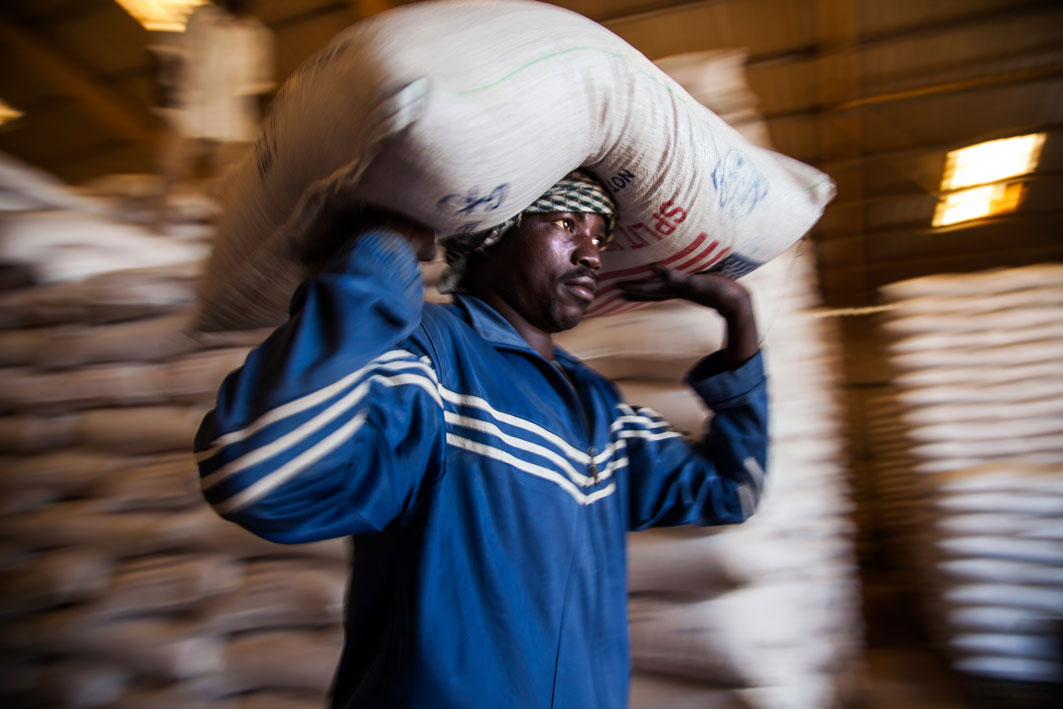
A World Food Programme (WFP) staff member loads bags of split yellow peas into a truck for delivery and distribution at camps for displaced persons (IDPs) in North Darfur. ?UN Photo/Albert Gonz芍lez Farran
We reached a critical juncture in the past year. Humanitarian needs outpaced anything we have seen before, stretching our responses to the breaking-point. During the reporting period, the 51勛圖 and its partners appealed for $19.9?billion to assist 82 million people in 38 countries. This represents a tripling of the number of people targeted for humanitarian assistance in the past 10 years. While funding reached a record high of $10.6 billion in 2015, the resulting shortfall was also the largest ever. Forced displacement also reached unprecedented levels: the number of persons internally displaced owing to conflict and violence was 40.8?million by the end of 2015, and the global refugee total reached 20.2 million.
The year was dominated by five major emergencies, in the Central African Republic, Iraq, South Sudan, the Syrian Arab Republic and Yemen. In the Syrian Arab Republic, some 13.5 million people were in need of humanitarian assistance, 6.5 million were internally displaced and nearly 4.6 million were refugees. In Yemen, approximately 82 per cent of the population (21.2 million people) needed humanitarian assistance. A total of 346 natural disasters were recorded in 2015, claiming an estimated 23,363 lives, affecting 90.3 million people, displacing more than 19.2 million people in 113 countries, and causing damage worth over $65.2?billion.
The 2015/16 El Ni?o, one of the worst on record, has had devastating humanitarian impacts, leaving more than 60 million people in need of humanitarian assistance due to exacerbated droughts, floods and other extreme weather events. On 20 May, I announced the appointment of two Special Envoys on El Ni?o and Climate to increase attention to these challenges. The Sendai Framework for Disaster Risk Reduction brings disaster reduction into the mainstream of humanitarian as well as development action in an unprecedented way.
In the light of the strains on the humanitarian system, I convened the first World Humanitarian Summit in Istanbul on 23 and 24 May. Three years of intensive, inclusive multi-stakeholder consultations paved the way for the Summit. Other inputs included the High-level Panel on Humanitarian Financing and my own report entitled ※One humanity: shared responsibility§ (), which laid out five core responsibilities critical to delivering better for humanity. Member States, 51勛圖 agencies, civil society, non-governmental organizations, the private sector and affected people met in Istanbul to mark a turning point in respect of what needs to change to better address and reduce humanitarian need, risk and vulnerability over the longer term.
While the scale and duration of humanitarian crises around the world has stretched the humanitarian sector to its limit, global challenges such as political impasses in the face of crises, climate change, fragility and growing economic inequality, or pandemics, point to increasing humanitarian need in the future. This is a crucial time to invest in enhancing local capacities, reducing risk and building effective and inclusive institutions, especially in fragile contexts. We must also invest in women and girls, who are often affected differently and disproportionally by humanitarian crises. There was an unequivocal call for action at the Summit.
Member States and other stakeholders announced commitments and initiatives within the framework of the Agenda for Humanity and the five core responsibilities in order to drive change and reduce human suffering today and tomorrow. Humanitarian actors must continue to deliver predictable, timely and relevant assistance to affected people fully in accordance with humanitarian principles, and stronger efforts in prevention and preparedness, as well as in achieving sustainable results that contribute to reducing need, must be prioritized.
The World Humanitarian Summit and the Agenda for Humanity provided an historic opportunity to put affected people at the centre, but also remind us that we must transcend the humanitarian-development divide by working to reduce people*s vulnerability and risk.?
